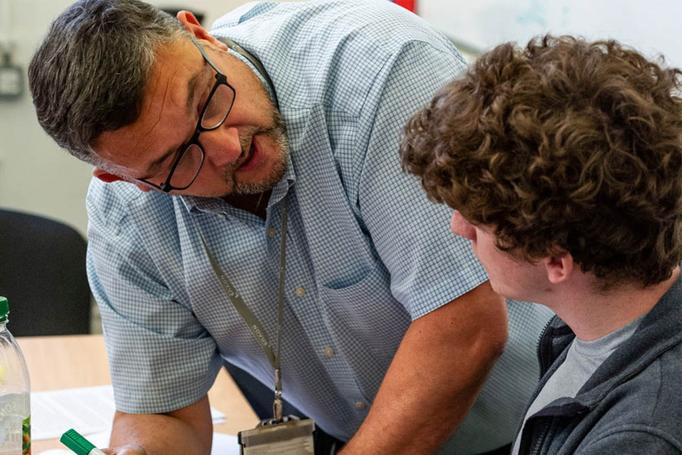Prison Education in Youth Establishments
At Novus, we offer comprehensive education and training services to help young offenders gain essential skills for further education or employment after release from custody.
Tailored education and training
Our youth provisions and services are designed to meet the diverse needs and interests of each child, delivered by a dedicated team of trauma-informed professionals.
The Novus delivery model for children and young people includes high-quality education, arts & enrichment, vocational training, career routeways and comprehensive support.
We provide a range of education and training opportunities, including:
- Maths, English, and Digital Skills courses
- Vocational and technical education
- Higher-level and distance learning courses
- Enrichment and engagement activities
- Personal and Social Development (PSD) programmes
Our provisions are designed to develop self-confidence, enjoyment, and additional skills in young offenders.

Youth offender employment
Employment is a key factor in rehabilitation and reducing the risk of re-offending. However, it can be difficult for any young person to secure, let alone a young offender.
Our team works closely with young offenders to help them identify fulfilling career paths and take the necessary steps to achieve their goals.

Why young offenders need support
Children in custody face unique challenges, including trauma, neurodiverse needs, missed developmental opportunities, mental health struggles, and more.
Despite these challenges, children are highly resilient and capable of extraordinary change if provided with the tailored education, support, and opportunities they need.
Our youth provisions and innovative projects enables children to confidently set out towards positive futures.
Our commitment to supporting young offenders
For almost 30 years, Novus has been committed to supporting offenders of all ages - from custody through to the community.
We work in close partnership with our group and sister organisations, employers, fellow providers, government agencies, and community stakeholders to improve the lives of young offenders and their communities.
Most importantly, we work with care and commitment - and in partnership with the young people that we support – through the Secure Stairs Framework.
Working together, we can make a difference to every child, their family, and their community - now, and for the future.
Let there be no doubt. Education should be at the heart of the prison system... Prisoners are in prison because they have done wrong. But once they have served their time, it is just... and in the interests of their communities that they have... the chance to re-enter society successfully, to find work, to live fullfilling lives. If education is the engine of social mobility, it is also the engine of prisoner rehabilitation.
— Dame Sally Coates, Unlocking Potential: A review of education in prison (May 2016), Ministry of Justice
Frequently Asked Questions
Is youth crime a problem in the UK?
Yes, youth crime is a significant issue in the UK.
From 2022-2023, children aged 15-17 made up 36% of the 10–17-year-old population in England and Wales - but accounted for 74% of the offending population. This highlights the disproportionate involvement of young people in criminal activities.
What age group commits the most crime in the UK?
Yes, youth crime is a significant issue in the UK.
From 2022-2023, children aged 15-17 made up 36% of the 10–17-year-old population in England and Wales - but accounted for 74% of the offending population. This highlights the disproportionate involvement of young people in criminal activities.
What is the most common youth crime in the UK?
The most common youth crimes in the UK are anti-social behaviour and theft & handling, seen in 79% and 71% of incidences of young offending behaviour.
These crimes are frequently committed by young people, indicating the need for targeted interventions.
How many young offenders reoffend in the UK?
In the UK, 34% of juvenile offenders reoffend within a year of being released - meaning that over a third of young offenders are reconvicted.
Reoffending rates for juveniles have stayed relatively consistent, ranging between 29% and 44% over recent years.
Why is education important for youth offenders?
Education is crucial for youth offenders because it helps them develop essential skills and knowledge that can significantly improve their future prospects.
Young offenders who engage in learning during their sentence are more likely to find employment and less likely to reoffend. Education provides them with a sense of purpose and self-worth, which is vital for rehabilitation.
Here are some key benefits of education for youth offenders:
- Improved job prospects: Education increases the chances of securing employment, which is a critical factor in reducing reoffending rates.
- Personal development: It helps build self-esteem, confidence, and social skills, aiding their overall personal growth.
- Reduced reoffending: Participation in educational programmes is linked to lower reoffending rates, contributing to safer communities.
- Breaking the cycle of crime: Education offers a pathway out of the cycle of crime and poverty, providing young offenders with opportunities for a better life.
Investing in education for youth offenders is a proactive approach to tackling crime and ensuring that young individuals have a chance to lead fulfilling, upstanding lives.
For more information on how Novus supports young offenders, visit our website or contact us today.
Explore our educational provisions, success stories, and ways to get involved.
Together, we can make a lasting difference in the lives of young individuals and our wider community.








